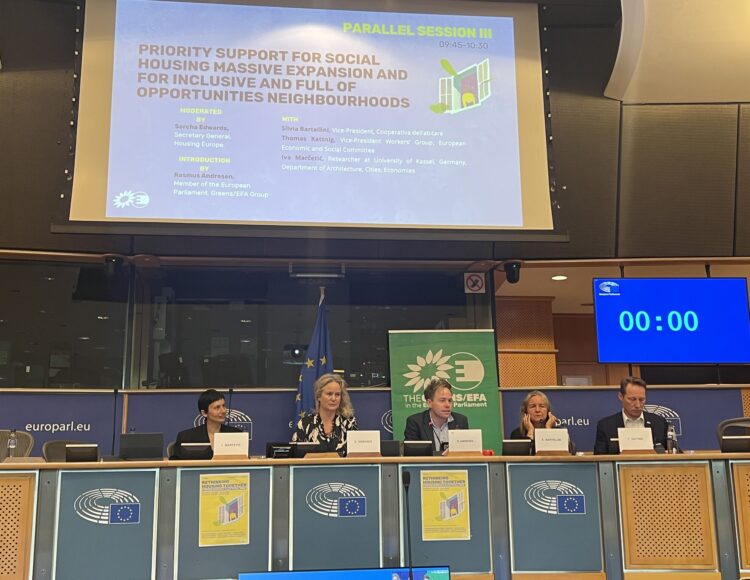A conference agenda (especially in Brussels) can sometimes tell you whether an event is done to tick a box or whether there is genuine appetite for change.
The The Greens/EFA in the European Parliament showed the latter. They spoke about massive expansion of social housing and the party’s new paper backs public, cooperative and social housing providers in full.
As our Secretary-General, Sorcha Edwards said “money and power can’t steamroll the right to housing”.
MEP Rasmus Andresen set the tone, insisting that long-term affordability and inclusive neighbourhoods must be binding conditions and calling for a dedicated EU Housing Fund in the next budget.
What does this mean in practice? Here is one example out of many.
Silvia Bartellini, Vice-President of Cooperativa dell’Abitare and our Italian member, Legacoop Abitanti explained how in 1894, they introduced undivided ownership. Fast forward 130 years, and the formula still delivers with 6,000 shareholders, 72 buildings and 3,000 affordable apartments. On top of this, the cooperative is financed almost entirely with own funds.
With the help of the Italian Superbonus, a COVID-recovery fund, these cooperatives are driving the green transition, installing thermal insulation, phasing out gas, adding solar PV, and boosting energy performance. They even created Italy’s first Solidarity Energy Community, enabling independent living for both seniors and young people. Yet Silvia also warned that rising construction and operating costs now pose a major challenge.
Thomas Kattnig from the European Economic and Social Committee Workers’ Group stressed that social housing is not a “nice to have” but a pillar of democracy and the social economy. Without it, too many end up in poverty. “Social housing has a leverage effect in the economy”, he said and gave the example of his own home country Austria, and especially Vienna.
Researcher Iva Marčetić from University of Kassel added a warning: the East–West divide persists. Europe, she said, needs housing infrastructures, not one-off projects, with limited-profit rules embedded as a safeguard to tame speculation.
This is where the upcoming EU Affordable Housing Plan must be more than slogans: it should focus on how working formulas like the Italian cooperatives or Austrian limited-profit housing can be transferred, adapted and scaled across Europe.
When something has proved resilient for over a century, combining affordability, community and sustainability, it deserves to shape the EU’s next housing chapter.
From paper to practice: The Greens’ call for massive expansion of social housing
